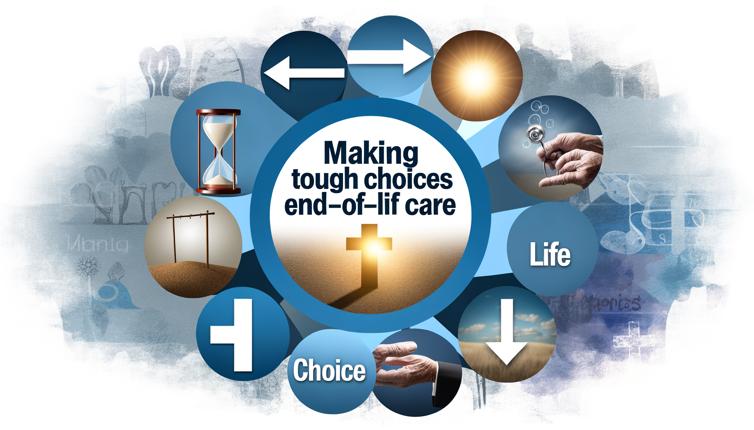Understanding End-of-Life Care Options
Before making tough choices about end-of-life care, it is important to understand the options available. There are several different types of care that can be provided at the end of life, including hospice care, palliative care, and curative care. Each option has its own benefits and considerations.,Hospice care is focused on providing comfort and support to individuals with a terminal illness. It is usually provided in the person's home or in a hospice facility and includes pain management, emotional support, and assistance with daily tasks.,Palliative care is similar to hospice care, but it can be provided at any stage of a serious illness. The goal is to improve quality of life for individuals and provide relief from the symptoms and stress of the illness.,Curative care, on the other hand, focuses on treating and curing the illness. This may involve surgeries, medications, or other medical interventions. It is important to understand that curative care may not always be possible or effective.,By understanding these options, individuals can make informed decisions about the type of care they would like to receive at the end of their lives.
Considerations When Making Tough Choices
When making tough choices about end-of-life care, there are several important considerations to keep in mind. First and foremost, it is important to think about one's own values, beliefs, and goals. What matters most to you? What kind of life-sustaining treatments would you want or not want?,It is also important to discuss these choices with loved ones, including family members, close friends, and healthcare providers. Having open and honest conversations can help ensure that everyone understands your wishes and can advocate for you if needed.,Another consideration is the financial implications of end-of-life care. Some treatments and care options may be expensive, and it is important to consider how these costs will be covered. This may involve looking into insurance options or creating a financial plan.,Finally, it is important to revisit and update your choices over time. Our values and priorities can change, and it is important to make sure that our end-of-life care choices reflect those changes.,By taking these considerations into account, individuals can make tough choices about end-of-life care that align with their own values and beliefs.
Resources for Making Tough Choices
Making tough choices about end-of-life care can be overwhelming, but there are resources available to help guide the decision-making process. These resources can provide information, support, and guidance as individuals navigate the complex healthcare system.,One resource is advance care planning, which involves documenting one's wishes for future healthcare decisions. This can include appointing a healthcare proxy, creating a living will, or completing an advance directive. These documents can help ensure that one's wishes are respected and followed.,Another resource is palliative care teams, which can provide guidance and support for individuals and their families. These teams can help individuals understand their options, manage symptoms, and make decisions about care.,Additionally, there are many online resources and organizations that provide information and support for end-of-life care decision-making. These resources can help individuals access information, find support groups, and connect with others who are facing similar decisions.,By utilizing these resources, individuals can make informed choices about their end-of-life care and ensure that their wishes are respected and honored.
Conclusion
Making tough choices about end-of-life care is never easy, but it is an important part of ensuring that our wishes are respected and that we receive the care we want. By understanding the options, considering our values and goals, and utilizing available resources, we can make choices that align with our own beliefs and priorities. It is never too early to start thinking about end-of-life care and having conversations with loved ones. By planning ahead, we can ensure that our wishes are known and respected, providing peace of mind for ourselves and our loved ones.








